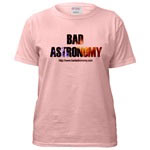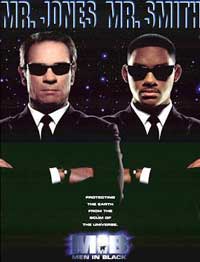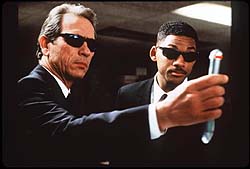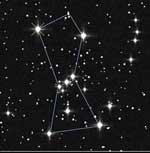
| Bad Astronomy |
|
|
|
BA Blog
|
|
Q & BA
|
|
Bulletin Board
|
| Media |
|
|
|
Bitesize Astronomy
|
|
Bad Astro Store
|
|
Mad Science
|
|
Fun Stuff
|
| Site Info |
|
|
|
Links
|
| RELATED SITES |
| - Universe Today |
| - APOD |
| - The Nine Planets |
| - Mystery Investigators |
| - Slacker Astronomy |
| - Skepticality |
Buy My Stuff

Keep Bad Astronomy close to your heart, and help make me
filthy rich. Hey, it's either this or one of those really
irritating PayPal donation buttons here.
Review: Men in Black
 I loved this movie.
I loved this movie.
Surprised? "What's a skeptical, UFO-bashing, aliens-aren't-visiting-us-and-excoriating-cow-you-know-whats scientist-type guy going around saying he loves a movie whose very premise is that not only do aliens exist, but live among us?" you are asking yourself.
Well, the movie is awesome. It rocks. I laughed all the way through it. It's funny. It's also satirical, poking gentle but firm fun at the whole UFO and alien subculture.
Yes, I have evidence for this assumption, and I'll get to it in the review. Since the movie came out in 1997, I won't bother with a spoilers page. However, if you have not seen it, go out and rent it right now. It's hysterical, and the review will make a wee bit more sense if you know what's going on. Also, I do spoil the ending in the review.
The premise is that aliens use Earth as a kind of political asylum. The refugees of the universe, generally not the best and the brightest, come here and, under disguise for the most part, try to make a decent living for themselves. Running the situation is an undercover organization with no name, but the agents are called " Men in Black", because they wear black suits. They have access to advanced technology, of course. Veteran Agent K (Tommy Lee Jones, with an amazingly funny comic turn) takes new agent J (Will Smith, playing, as usual, Will Smith) under his wing, to train him as a replacement.
So, let's get to the review!
Bad:
When Agent K is debriefing Agent J, he says:
"1500 years ago, everybody knew the Earth was the center of the Universe. 500 years ago, everybody knew that the Earth was flat... and 15 minutes ago, you knew people were alone on this planet. Think about what you'll know tomorrow."
Good:
Technically, the first part is true. The idea of the Earth being the center
of the solar system, and by default the Universe, was codified by
astronomer Cladius Ptolemaeus in roughly 140 or so A.D. It wasn't until
Copernicus, in 1512, that the Earth was removed from the center (it's
a myth that Copernicus's idea was more accurate than Ptolemaeus';
his system was just as loaded down with bad assumptions. However,
this got subsequently fixed when Kepler realized
orbits were not circles but ellipses, and astronomers haven't looked
back since). So even 500 years or so ago people still thought the
Earth was the center of the Universe.
The second statement, however, is definitely Bad Astronomy. It was known that the Earth was round since the time of the ancient Greeks. In fact, Eratosthenes not only knew it was round, but accurately measured its circumference in 200 B.C.! People say that Columbus was the only person who believed the Earth to be round in 1492, but that's a myth. Most educated people already knew this, and Columbus did not set out to prove the Earth was round. He was hoping to chart a course west to reach India more easily than having to sail around the Cape of Good Hope in Africa. He blew it, of course, but did achieve some other rather remarkable results.
Bad:
As Agent J is walking through the MiB compound, he sees a tall
sluglike creature. Agent K pulls him away, saying,
"You want to stay away from that guy. He's, uh, he's grouchy. A three hour delay in customs after a trip for 17 trillion miles is gonna make anybody cranky."
Good:
Arg, so close! Stellar distances get abused by
practically all movie writers. The nearest known star to the Sun
is Proxima Centauri, which is roughly 25 trillion miles away.
So 17 trillion still falls a bit short. Still, I give them
some credit: most movies get numbers completely wrong, saying
"millions" of miles, which would barely get you
to the nearest planets in our own solar system (Venus, at its
closest is about 26 million miles away).
I'll note that Proxima Cen may not be the closest star to the Sun. Brown dwarfs are very faint stars, and an old, cool one might be significantly closer (well, in astronomical terms). One might be only a light year or two (6-12 trillion miles) away. If so, then the movie may be right after all. Maybe the slug made a pit stop at a brown dwarf a few light years away. I'd be grumpy too.
Bad:
When Agent J asks K how they can afford to run the organization,
K replies,
"We hold the patents on a few gadgets that we confiscated from out-of-state visitors - velcro, microwave ovens, liposuction..."
Good:
This line cracked me up! It is a very common myth that NASA invented Velcro. In fact, it was around for quite some time before NASA began; Velcro was patented in 1955, while NASA was founded in 1958.
Also, it's a persistent idea in UFO circles that a lot of today's advanced technology was actually stolen from the crashed alien spaceship in Roswell, New Mexico. This is called "reverse engineering", because it means you have something in hand and figure out how to build it by examination, rather than engineering it from scratch. You can imagine what I think of such a hypothesis. Why do some people have such a disdain for human inventiveness? Do they not think we're clever enough to come up with some of this stuff on our own?
And hmmm... "out-of-state-visitors"? Well, I guess that's technically true. But why do aliens need liposuction?
Anyway, this scene makes it clear to me they are poking fun at the UFO folks. I'm sure I'll get tons of email about this from them, but let me say this now: like it or not, this movie was very satirical about UFOs, aliens and all that. If you're unhappy with that, then go watch "Arrival" with Charlie Sheen.
Bad:
Agent K is showing Agent J that a lot of people he thinks are humans are
in reality aliens in disguise. He says to J that it probably doesn't
make sense to him, and J replies,
"Well, no, it makes perfect sense. When I was in the third grade, everybody thought I was crazy, but I knew our teacher had to be from Venus or something like that.".
Agent K replies, "Mrs. Edleson. Jupiter, actually... well, one of the moons."
Good:
This one they got right. Well, in the context of the movie at least. Venus
is not habitable by anything that could be remotely human, and
is probably completely uninhabitable. For one thing, the surface temperature
is 475 degrees Centigrade (hot enough to melt lead). For another, there's
no oxygen in the air. For another, it rains sulphuric acid. Ouch! [Note
added July 5, 2002: I originally wrote that the temperature was 900
C, which is way too high; I was thinking in Fahrenheit for some reason.
Yet another reason to go with the metric system and stick with it.]
Jupiter has the small problem of lacking a solid surface. But the moons... Europa is an iceball moon orbiting Jupiter, and it looks pretty certain that underneath the frozen surface is an ocean, perhaps of water. NASA is considering sending a probe there to test the waters, so to speak. The other three large moons of Jupiter may not be so nice, but they are big enough to nearly be planets in their own right. If life came from that part of the solar system, Jupiter's moons would be a likely source.
 Bad:
Bad:
Agent J is being shown advanced technology. He accidentally
touches a glowing ball, which then violently shoots around the compound,
destroying everything in its path. When Agent K catches it, he
says
"This thing caused the 1977 New York blackout. Practical joke by the Great Attractor. He thought it was funny..."
Good:
I thought it was funny too! The "Great Attractor" line is
an inside joke. It's a term for
a very large mass of galaxies located
very far away. The mass of this cluster of galaxies is so huge
that its gravity is drawing matter toward it for hundreds of
millions of light years, hence its name. To put that in the movie
script says that someone on the writing team knew a bit of astronomy.
I am truly amazed, and pleased!
Bad:
The problem in the movie starts when a member of an alien
race known simply as "bugs" comes here to steal an amulet
which contains a source of incredible power. A dying alien says
that the galaxy is located in Orion's belt. Agent J tells this
to Zed, the man in charge of the organization. Zed says,
"Here's Orion [displaying a map of the sky]. It's a grouping of the brightest stars of the northern sky-- and here's Orion's belt. The belt is just these three stars. Galaxies are huge; they're made up of billions of stars. You heard wrong."
 Good:
Good:Hey, they got this one right too! Orion is a constellation, a grouping of stars in the sky. The stars may have nothing to do with each other physically, but may just happen to look near each other in the sky. Orion is perhaps the most recognizable of all constellations, because it it indeed made up of some of the brightest stars, but also because it lies right in a part of the sky which makes it visible all over the Earth. I can nitpick the movie a bit and say that it doesn't have the brightest stars, just some of them, and also only half of it is in the northern sky; the "bottom" half of the constellation is in the southern sky. Still, close enough.
Orion's belt is also easily recognizable as three stars nearly in a line, bisecting Orion. In the movie, the map shown had the stars visibly mis-aligned, and I'm not sure why they blew that. Still, they were also right to say that galaxies have billions of stars, and there is no galaxy on Orion's belt. However, there are many distant galaxies that happen to lie, as seen by us, in the direction of Orion's belt. One might say they are in the belt, but not on it. Nitpicking, I know, but actually this point was crucial to the movie. The joke is that the galaxy in question was small, very small, and was trapped in an amulet that hung from a cat's collar. The cat's name was Orion.
Conclusion
This movie is an absolute riot, and I really liked it. The astronomy was actually pretty good, with only relatively minor errors, when they could have just as easily made really huge ones. And when they went into specifics about astronomy, they typically got it right. So here you have it: the rare review where I liked the movie, and they made Good Astronomy. Ironically, it's in a movie about UFOs. Wow. If only more UFO movies got anything right...|
|
 |